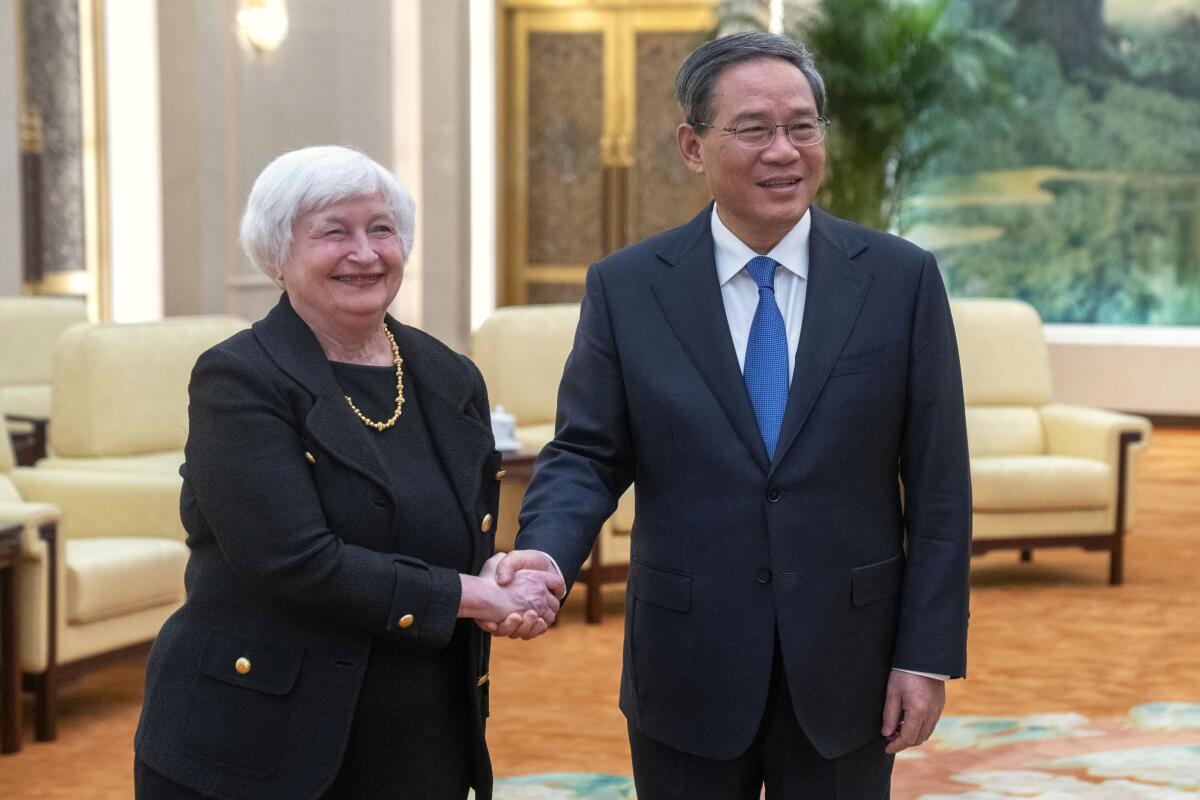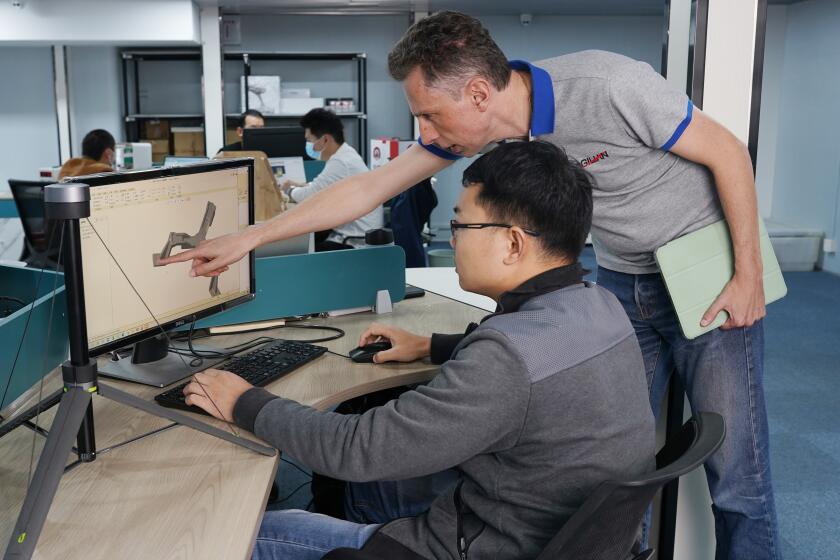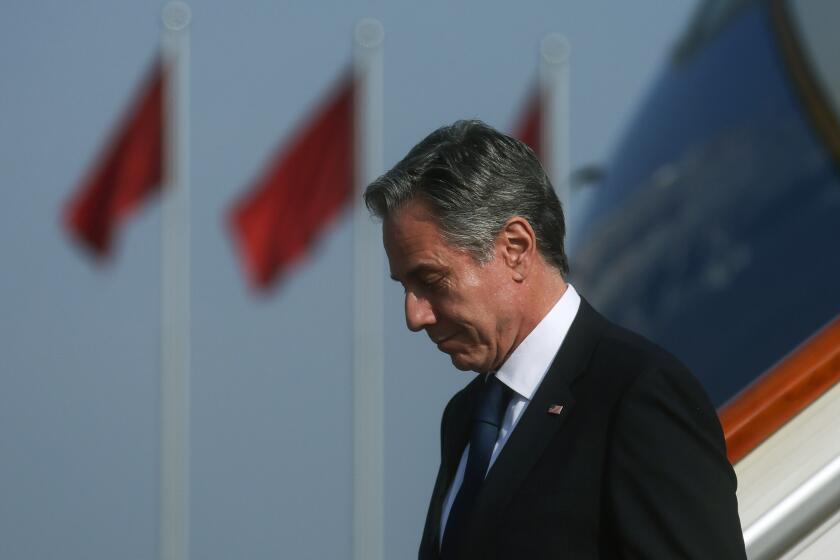Yellen appeals to China to revive talks and not let technology tensions disrupt ties

- Share via
BEIJING — U.S. Treasury Secretary Janet L. Yellen and Chinese Premier Li Qiang expressed hopes Friday for better communication as Yellen appealed to Beijing not to let frustration over U.S. curbs on technology exports disrupt economic cooperation.
Both governments used positive terms to describe Yellen’s visit to China’s capital, which was aimed at improving strained relations, and stressed the importance of U.S.-China economic ties.
Yellen and Li announced no new plans for more high-level meetings to revive contacts that disputes over technology, security and other irritants have disrupted. Yet, Yellen is the latest of several senior U.S. officials traveling to Beijing to encourage Chinese leaders to revive interactions between the governments of the world’s two largest economies.
Treasury officials said earlier she wouldn’t meet with Chinese leader Xi Jinping, and no breakthroughs had been expected.
In a one-hour meeting with China’s No. 2 leader, Yellen said Washington and Beijing have a duty to cooperate on issues that affect the world. She appealed for “regular channels of communication” and, more pointedly, for “healthy economic competition,” a reference to complaints that China is stepping up subsidies and market barriers to protect its companies.
At the same time, Yellen defended “targeted actions,” a reference to curbs on Chinese access to advanced processor chips and other technology, saying they were needed to protect national security.
“You may disagree,” the Treasury chief said. “But we should not allow any disagreement to lead to misunderstandings that needlessly worsen our bilateral economic and financial relationships.”
Li said he hoped Washington would “meet China halfway” but gave no indication of possible changes to Chinese trade and other policies that have irked Washington.
“China’s development is an opportunity rather than a challenge to the United States and a benefit rather than a risk,” Li said, according to a statement from the country’s Ministry of Foreign Affairs. “The two sides should strengthen communication and seek consensus on important issues in the bilateral economic field through candid, in-depth, and pragmatic exchanges.”
First tariffs, then COVID, now worries of war. Multinational companies have more reasons than ever to get out of China — if they can.
The Chinese Finance Ministry called Yellen’s visit a “concrete measure” toward carrying out an agreement by Xi and President Biden during a meeting in November to improve relations. The ministry called on Washington to make the next move.
“We hope the United States will take concrete actions to create a favorable environment for the healthy development of economic and trade relations,” a ministry statement said.
Yun Sun, a senior fellow at the Washington-based Stimson Center, said any major pronouncements on economic agreements would more likely come out of meetings between the nations’ respective presidents, rather than finance ministers.
“I see Yellen’s meetings as a positive development and see it as a resumption of the senior level exchanges,” she said. The meetings also “build the ground for the potential of having something concrete,” to be agreed upon between world leaders at the September Group of 20 summit in India or Asia Pacific Economic Cooperation summit in San Francisco in November, she said.
Commerce Secretary Gina Raimondo unveiled tight new proposed restrictions on semiconductor manufacturers doing business in China.
U.S. curbs on Chinese access to technology threaten to delay or derail the ruling Communist Party’s efforts to develop telecoms, artificial intelligence and other technologies. Xi accused Washington in March of trying to hamper China’s development.
Beijing has been slow to retaliate, possibly to avoid disrupting its own tech industries. But this week, the government announced unspecified controls on exports of gallium and germanium, metals used in making semiconductors and solar panels. That announcement jolted South Korea and other countries that import from China.
Earlier Friday, Yellen criticized China’s treatment of U.S. companies during a meeting with businesspeople.
After worsening ties between China and the U.S., Blinken aims to find common ground in Beijing, the first U.S. secretary of state to visit in five years.
U.S. and other foreign companies are uneasy about their status in China following raids on consulting firms, the expansion of a national security law and calls by Xi and other officials for greater self-sufficiency.
“I am communicating the concerns that I’ve heard from the U.S. business community — including China’s use of nonmarket tools like expanded subsidies for its state-owned enterprises and domestic firms, and barriers to market access for foreign firms,” Yellen said, according to a transcript released by her department.
Yellen rejected suggestions that Washington is trying to decouple the U.S. economy from China’s.
Businesspeople have warned that the world’s two biggest economies might split into separate markets with incompatible products as the U.S. and China tighten trade controls and tell companies to reduce reliance on the other country. They say that will hurt economic growth and innovation.
China’s government is relaxing restrictions on night markets and street vendors to stimulate spending and create jobs, especially for young people.
″I have made clear that the United States does not seek a wholesale separation of our economies,” Yellen said. “A decoupling of the world’s two largest economies would be destabilizing for the global economy, and it would be virtually impossible to undertake.”
Yellen defended U.S. export curbs and rejected Chinese accusations that Washington uses them for economic advantage.
Also Friday, Yellen met with the outgoing governor of China’s central bank, Yi Gang, and former Vice Premier Liu He, previously her counterpart in finance talks, according to the Treasury.
Start your day right
Sign up for Essential California for the L.A. Times biggest news, features and recommendations in your inbox six days a week.
You may occasionally receive promotional content from the Los Angeles Times.
Secretary of State Antony J. Blinken met Xi last month in the highest-level U.S. visit to Beijing in five years. The two agreed to stabilize relations but failed to agree on improving communications between their militaries.
The latest flareup came after Biden referred to Xi as a dictator. The Chinese government protested, but Biden said his blunt statements are “just not something I’m going to change very much.”
Ties became especially testy after a Chinese surveillance balloon flew over the U.S. in February and was subsequently shot down.
Biden’s climate envoy, John Kerry, is scheduled to visit China next week. China and the U.S. are the world’s No. 1 and No. 2 emitters of climate-changing carbon, making whatever steps they take critical.
Beijing broke off climate discussions with the U.S. in August in retaliation for a visit by then-House Speaker Nancy Pelosi (D-San Francisco) to Taiwan, the self-ruled island democracy claimed by China as part of its territory.
More to Read
Sign up for Essential California
The most important California stories and recommendations in your inbox every morning.
You may occasionally receive promotional content from the Los Angeles Times.
















